七年级英语上册unit 5 Do you have a soccer ball? Section A(1a-2d)课件 (PPT共34张)
文档属性
| 名称 | 七年级英语上册unit 5 Do you have a soccer ball? Section A(1a-2d)课件 (PPT共34张) |
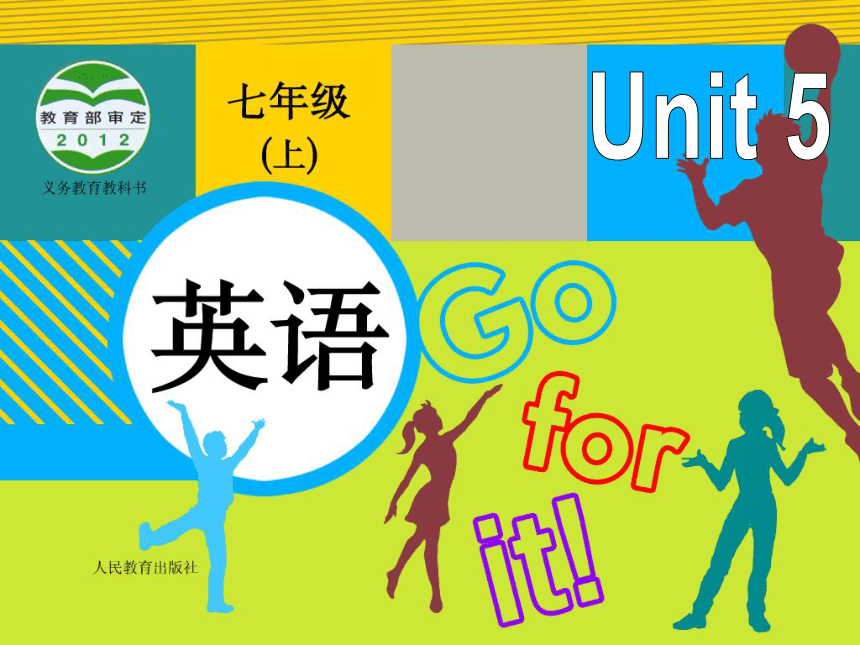
|
|
| 格式 | zip | ||
| 文件大小 | 8.8MB | ||
| 资源类型 | 教案 | ||
| 版本资源 | 人教新目标(Go for it)版 | ||
| 科目 | 英语 | ||
| 更新时间 | 2020-10-23 00:00:00 | ||
图片预览

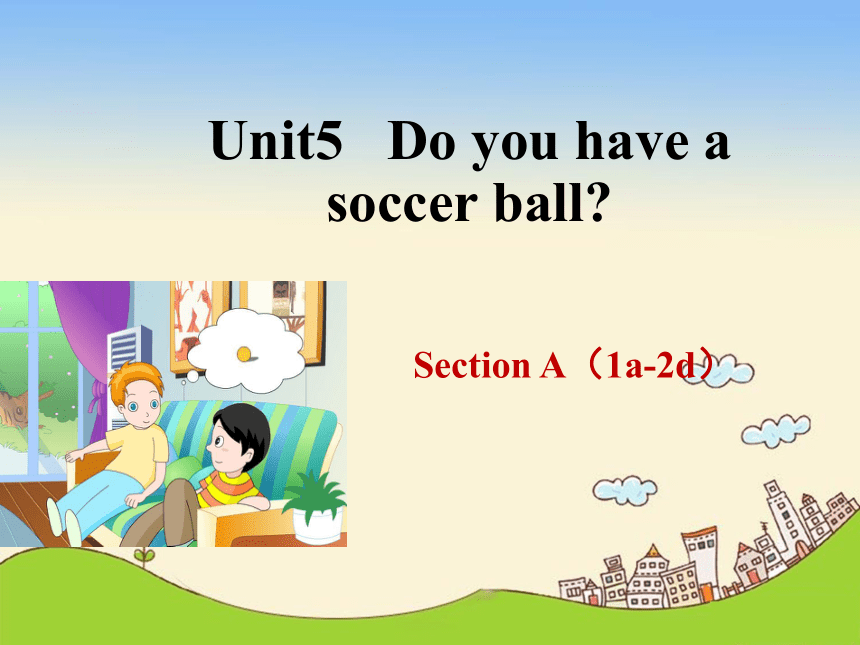
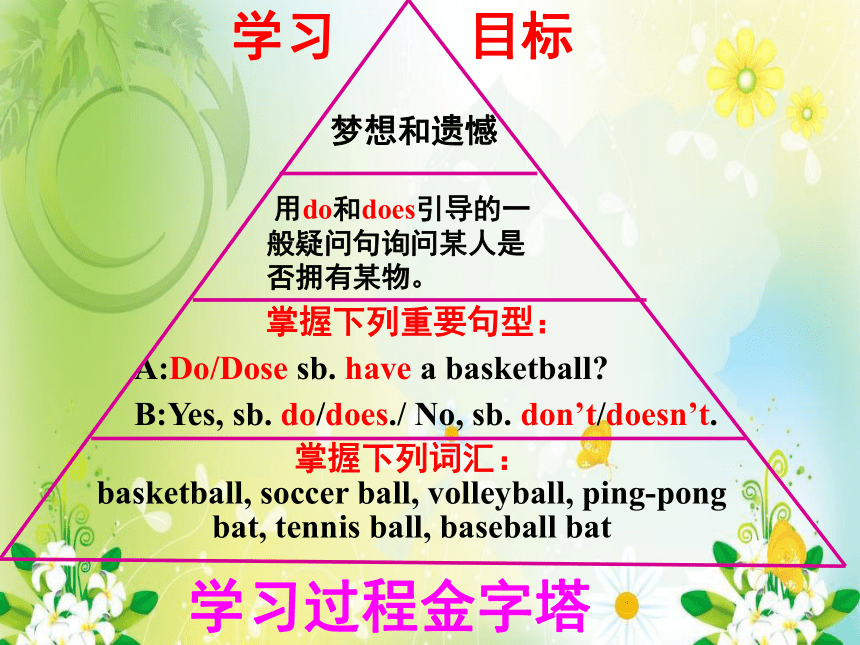
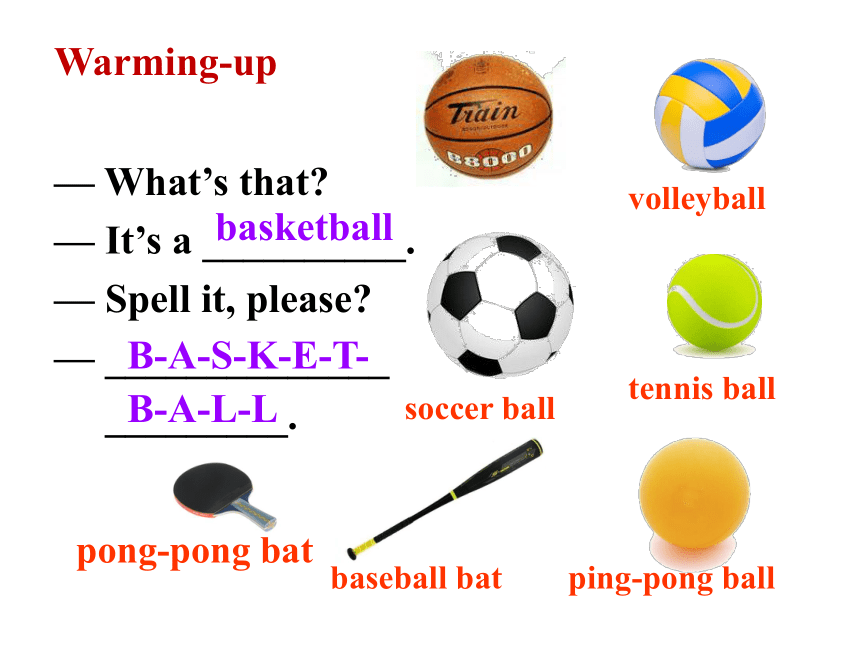
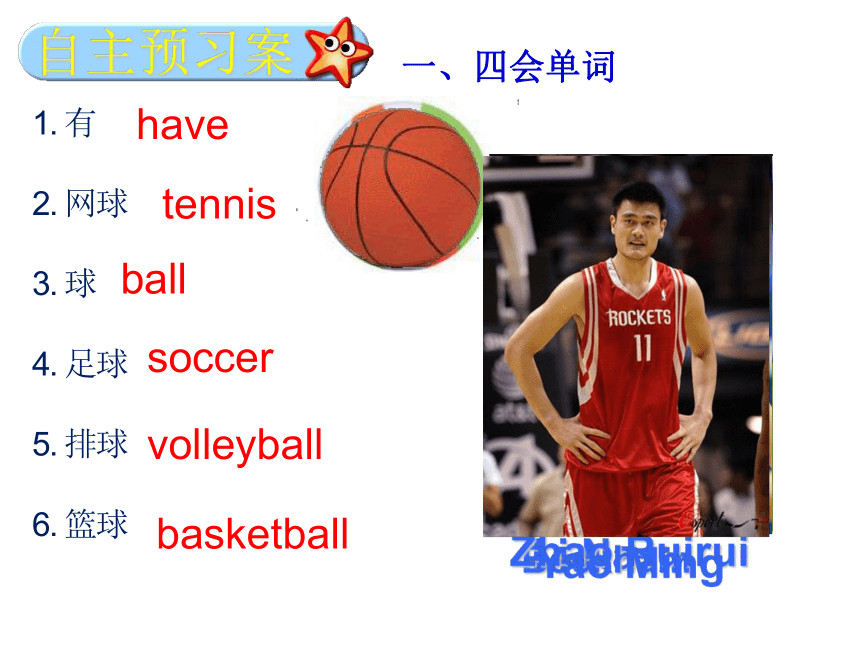
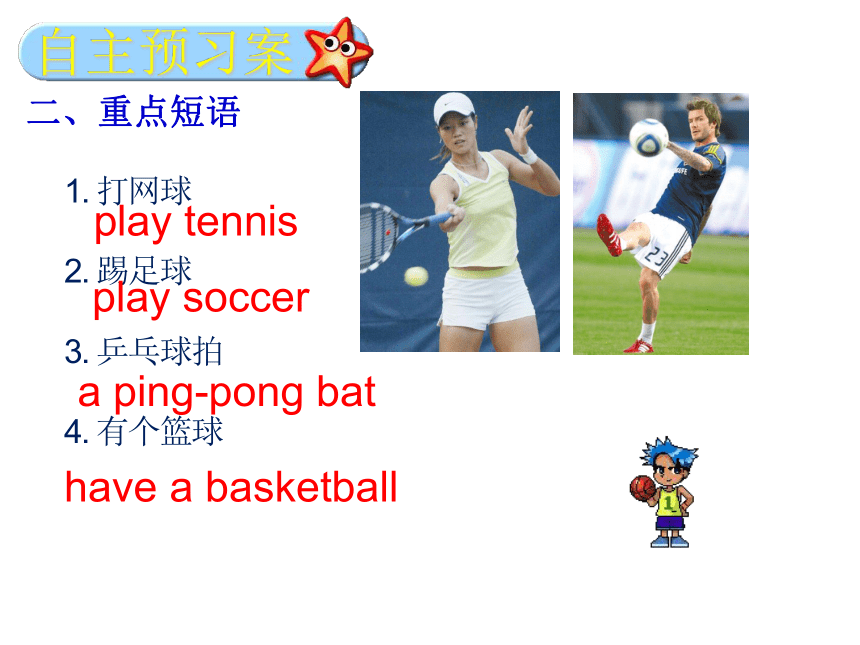
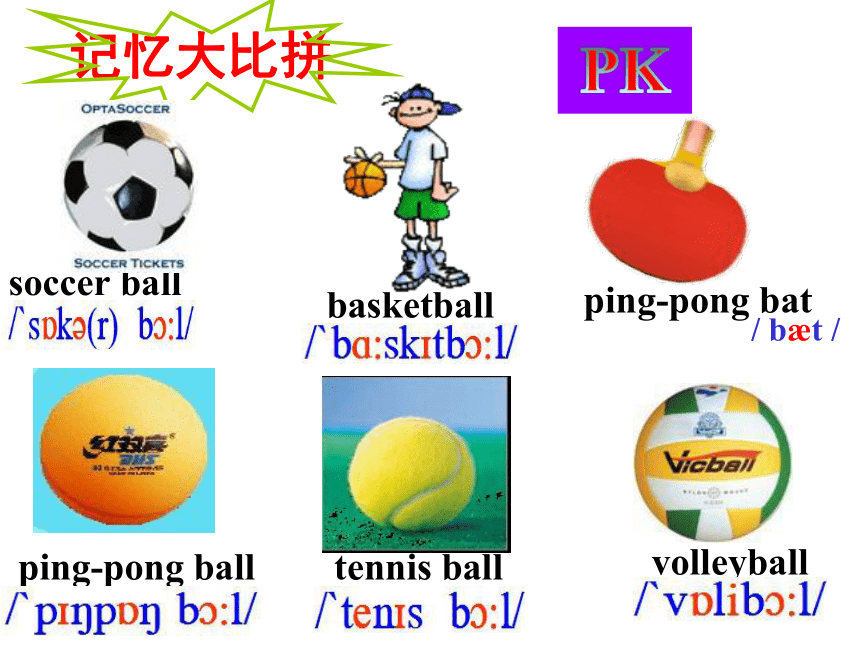
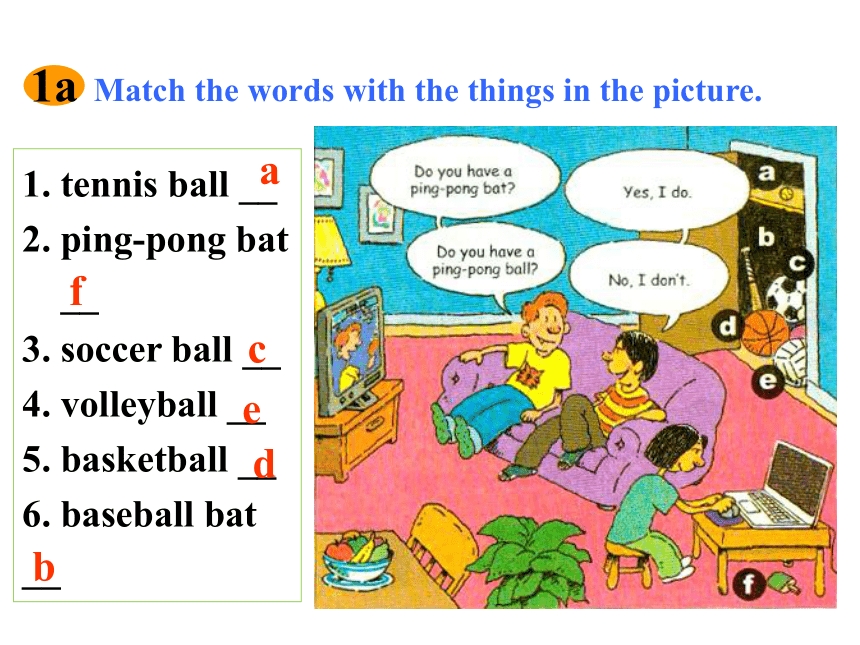
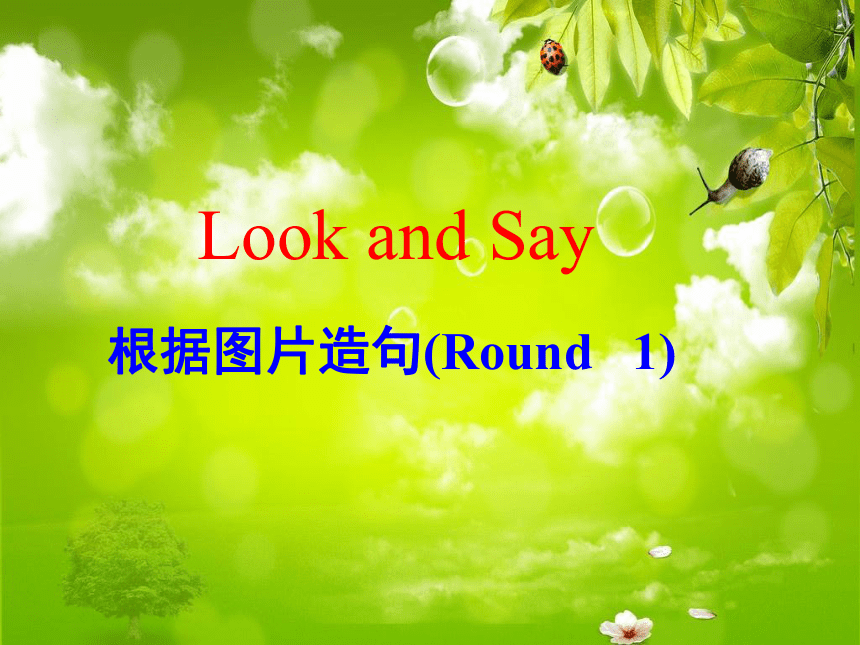
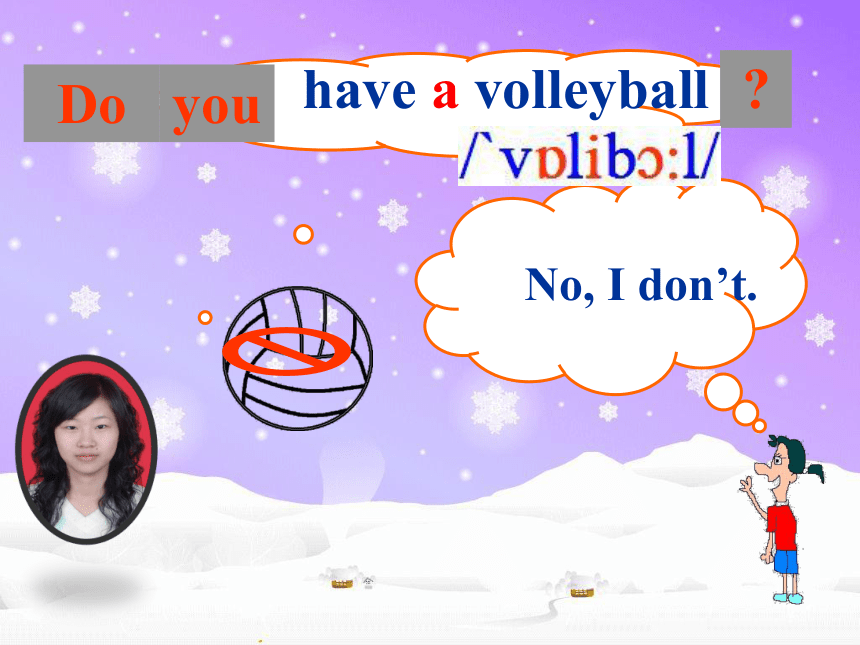
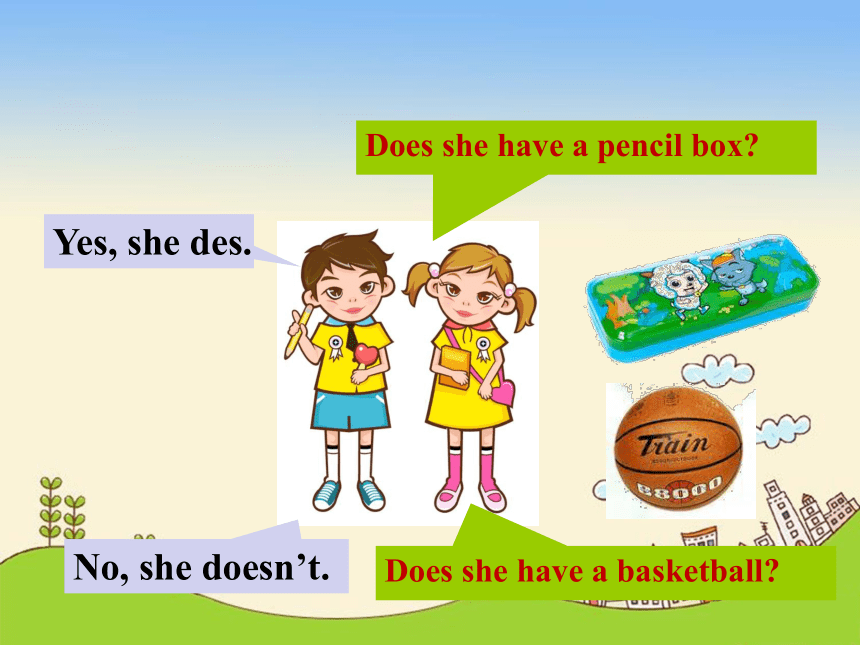
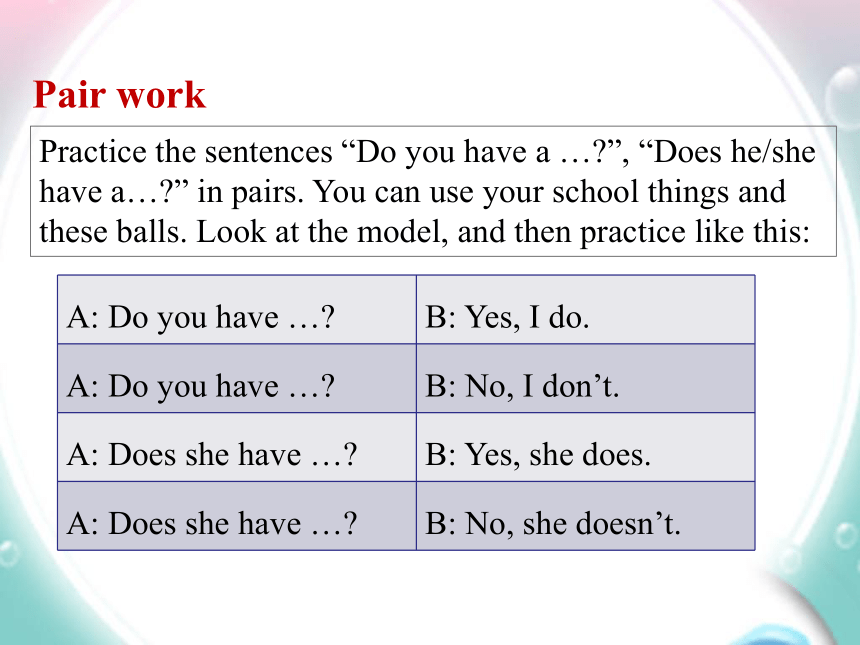
文档简介
(共34张PPT)
Unit
5
Unit5
Do
you
have
a
soccer
ball?
Section
A(1a-2d)
掌握下列重要句型:
A:Do/Dose
sb.
have
a
basketball?
B:Yes,
sb.
do/does./
No,
sb.
don’t/doesn’t.
掌握下列词汇:
basketball,
soccer
ball,
volleyball,
ping-pong
bat,
tennis
ball,
baseball
bat
梦想和遗憾
学习过程金字塔
学习
目标
用do和does引导的一般疑问句询问某人是否拥有某物。
—
What’s
that?
—
It’s
a
__________.
—
Spell
it,
please?
—
______________
_________.
basketball
B-A-S-K-E-T-B-A-L-L
soccer
ball
volleyball
tennis
ball
ping-pong
ball
baseball
bat
pong-pong
bat
Warming-up
自主预习案
1.
有
2.
网球
3.
球
4.
足球
5.
排球
6.
篮球
一、四会单词
have
tennis
ball
soccer
volleyball
basketball
自主预习案
1.
打网球
2.
踢足球
3.
乒乓球拍
4.
有个篮球
二、重点短语
play
tennis
play
soccer
a
ping-pong
bat
have
a
basketball
tennis
ball
ping-pong
ball
basketball
volleyball
soccer
ball
ping-pong
bat
记忆大比拼
PK
/
b?t
/
1.
tennis
ball
__
2.
ping-pong
bat
__
3.
soccer
ball
__
4.
volleyball
__
5.
basketball
__
6.
baseball
bat
__
a
f
c
e
d
b
1a
Match
the
words
with
the
things
in
the
picture.
Look
and
Say
根据图片造句(Round
1)
.
I
have
a
volleyball
.
Do
you
?
No,
I
don’t.
Does
she
have
a
pencil
box?
Yes,
she
des.
Does
she
have
a
basketball?
No,
she
doesn’t.
Pair
work
Practice
the
sentences
“Do
you
have
a
…?”,
“Does
he/she
have
a…?”
in
pairs.
You
can
use
your
school
things
and
these
balls.
Look
at
the
model,
and
then
practice
like
this:
A:
Do
you
have
…?
B:
Yes,
I
do.
A:
Do
you
have
…?
B:
No,
I
don’t.
A:
Does
she
have
…?
B:
Yes,
she
does.
A:
Does
she
have
…?
B:
No,
she
doesn’t.
Listen
and
circle
the
words
you
hear.
1b
/
b?t
/
A:
____you
_____a______________?
B:
___________.
A:
Do
you
have_______________?
B:
___________.
Listen
again
and
fill
in
the
blanks.
Do
have
ping-pong
bat
No,
I
don’t
a
ping-pong
ball
Yes,
I
do
A:
What’s
this
in
English?
B:
A:
How
do
you
spell
it?
B:
…
A:
Do
you
have
a
…?
B:
It’s
a
…
Yes,
I
do./
No,
I
don’t.
1c
Pairwork
Listen
to
the
conversations
and
number
the
pictures
[1-4].
2a
3
2
4
Listen
again.
Match
the
pictures
in
2a
with
the
balls.
2b
2
3
4
1
2c
Ask
and
answer
questions
about
the
people
in
2a.
Does
Jane
have
a
tennis
ball?
No,
she
doesn’t.
Cindy:
Hey,
Helen,
let’s
go!
We’re
late.
Helen:
OK.
Cindy:
Do
you
have
the
baseball?
Helen:
Yes,
I
do.
It’s
in
my
bag.
Cindy:
And
where’s
our
baseball
bat?
Helen:
Bill
has
it.
Cindy:
Oh,
yeah.
And
do
you
have
your
jacket?
Helen:
Oh,
no,
I
don’t.
It’s
on
the
chair.
Let
me
get
it.
Cindy:
And
your
hat,
too!
Helen:
OK,
I
have
my
jacket
and
hat.
Let’s
go.
Read
and
match
the
things
with
their
right
places.
2d
the
baseball
on
the
chair
the
baseball
bat
in
Helen’s
bag
Helen’s
jacket
Bill
has
it.
Match
the
things
with
their
right
places.
每个小组用下面的问题提问组员,并由其中一人就自己根据小组情况做一个报告。
Report
I
have
a
______,
but
I
don’t
have
a
______.
____
is
my
friend.
He
has
a______,
but
he
doesn’t
have
a__________.
___
is
my
friend.
She
has
a_______,
but
she
doesn’t
have
a
___________....
A:
Do
you
have
a
…?
B:
Yes,
I
do.
I
have
a
…/No,
I
don’t.
I
don’t
have
a
…
梦想和遗憾
Words:
do
(does),
have,
tennis,
ball,
ping-pong,
bat,
soccer,
soccer
ball,
basketball,
let,
us,
we,
late,
has,
get
2)
询问某人有某物的句型:
①
—Do
+主语+
have
…?
—Yes,
主语+
do.
/No,
主语+
don't.
②
—Does+主语+
have
…?
—Yes,
主语+
does./
No,
主语+
doesn’t.
3)
提建议的句型:
Let’s…
Summary
1.
have作动词,意为“有”,一般指某人拥有某物,侧重于所属关系。其第三人称单数形式是has。
常用句式为:某人
+
have/has
+
某物.,表示“某人有某物”。
在一般现在时态中,当主语为第三人称单数形式时,用has的形式。
e.g.我有一个好朋友。
I
have
a
good
friend.
她有一支新钢笔。
She
has
a
new
pen.
2.
late
“迟到”
是个形容词,常用
be
late
的结构。
e.g.杰克总是迟到。
Jack
is
always
late.
3.
we是人称代词主格,意为“我们”,在句子中作主语。
e.g.我们是好朋友。
We
are
good
friends.
我们有一个新足球。
We
have
a
new
soccer
ball.
4.
us
“我们”,
是we的宾格形式,在句子
中放在介词或动词后作宾语。
【辨析】we
/
us
/
our
we
“我们”
是人称代词主格形式,作句子的主语。
us
“我们”是人称代词宾格形式,放在介词或动词后作宾语。
our
“我们的”是形容词性物主代词,
放在名词前。
e.g.
我们在迈克的房间里。
We
are
in
Mike’s
room.
给我们打电话457-3287。
Call
us
at
457-3287.
我们的老师在教室里。
Our
teacher
is
in
the
classroom.
5.
以动词let开头的祈使句,表示向别人提
建议,意思是“让……做……吧”。
基本结构为:let
sb.
do
sth.,表示
“让某
人做某事”,表示说话人的建议。其中sb.
可由名词或代词宾格来充当,其后的动
词一定要用动词原形。
e.g.
Let
me
do
it.
让我来做吧。
Let
him
guess.
让他猜一猜。
一、
看图说出下列物品的英语单词。
basketball
soccer
ball
volleyball
baseball
baseball
bat
ping-pong
ball
ping-pong
bat
tennis
ball
Exercise
二、按要求转换句型,每空一词。
1.I
have
a
math
book.(改为一般疑问句)
you
a
math
book?
2.Tom
has
a
TV.(改为一般疑问句)
Tom
a
TV?
3.Does
he
play
sports
every
day?(作肯定回答)
,
he
.
4.Do
you
like
playing
basketball?(作否定回答)
,we
.
5.Lucy
has
a
ping-pong
ball.(改为否定句)
Lucy
a
ping-png
ball
.
Do
have
Does
have
Yes
does
No
don’t
doesn’
t
have
1.
你有一只棒球拍吗?
_____
you
______
a
baseball
_____?
2.
埃里克有一个网球吗?
_____
Eric
______
a
_______
ball?
3.
戴尔有一个足球和一个排球。
Dale
_____
a
______
ball
and
a
___________.
4.
我有一个篮球和一个乒乓球拍。
I
_____
a
___________
and
a
ping-pong
____.
Do
have
Does
have
tennis
has
soccer
volleyball
have
basketball
bat
bat
三、
根据汉语提示完成句子。
四、句型转换。
1.
Do
you
have
a
map?
(作肯定回答)
2.
Do
you
have
an
English
dictionary?
(作否定回答)
3.
Does
Linda
have
an
eraser?
(作肯定回答)
Yes,
I
do.
No,
I
don’t.
Yes,
she
does.
4.
Does
he
have
a
volleyball?
(作否定回答)
5.
I
have
a
nice
ping-pong
bat.
(用she来代替I)
______
_______
a
nice
ping-pong
bat.
No,
he
doesn’t.
She
has
Thank
you
Unit
5
Unit5
Do
you
have
a
soccer
ball?
Section
A(1a-2d)
掌握下列重要句型:
A:Do/Dose
sb.
have
a
basketball?
B:Yes,
sb.
do/does./
No,
sb.
don’t/doesn’t.
掌握下列词汇:
basketball,
soccer
ball,
volleyball,
ping-pong
bat,
tennis
ball,
baseball
bat
梦想和遗憾
学习过程金字塔
学习
目标
用do和does引导的一般疑问句询问某人是否拥有某物。
—
What’s
that?
—
It’s
a
__________.
—
Spell
it,
please?
—
______________
_________.
basketball
B-A-S-K-E-T-B-A-L-L
soccer
ball
volleyball
tennis
ball
ping-pong
ball
baseball
bat
pong-pong
bat
Warming-up
自主预习案
1.
有
2.
网球
3.
球
4.
足球
5.
排球
6.
篮球
一、四会单词
have
tennis
ball
soccer
volleyball
basketball
自主预习案
1.
打网球
2.
踢足球
3.
乒乓球拍
4.
有个篮球
二、重点短语
play
tennis
play
soccer
a
ping-pong
bat
have
a
basketball
tennis
ball
ping-pong
ball
basketball
volleyball
soccer
ball
ping-pong
bat
记忆大比拼
PK
/
b?t
/
1.
tennis
ball
__
2.
ping-pong
bat
__
3.
soccer
ball
__
4.
volleyball
__
5.
basketball
__
6.
baseball
bat
__
a
f
c
e
d
b
1a
Match
the
words
with
the
things
in
the
picture.
Look
and
Say
根据图片造句(Round
1)
.
I
have
a
volleyball
.
Do
you
?
No,
I
don’t.
Does
she
have
a
pencil
box?
Yes,
she
des.
Does
she
have
a
basketball?
No,
she
doesn’t.
Pair
work
Practice
the
sentences
“Do
you
have
a
…?”,
“Does
he/she
have
a…?”
in
pairs.
You
can
use
your
school
things
and
these
balls.
Look
at
the
model,
and
then
practice
like
this:
A:
Do
you
have
…?
B:
Yes,
I
do.
A:
Do
you
have
…?
B:
No,
I
don’t.
A:
Does
she
have
…?
B:
Yes,
she
does.
A:
Does
she
have
…?
B:
No,
she
doesn’t.
Listen
and
circle
the
words
you
hear.
1b
/
b?t
/
A:
____you
_____a______________?
B:
___________.
A:
Do
you
have_______________?
B:
___________.
Listen
again
and
fill
in
the
blanks.
Do
have
ping-pong
bat
No,
I
don’t
a
ping-pong
ball
Yes,
I
do
A:
What’s
this
in
English?
B:
A:
How
do
you
spell
it?
B:
…
A:
Do
you
have
a
…?
B:
It’s
a
…
Yes,
I
do./
No,
I
don’t.
1c
Pairwork
Listen
to
the
conversations
and
number
the
pictures
[1-4].
2a
3
2
4
Listen
again.
Match
the
pictures
in
2a
with
the
balls.
2b
2
3
4
1
2c
Ask
and
answer
questions
about
the
people
in
2a.
Does
Jane
have
a
tennis
ball?
No,
she
doesn’t.
Cindy:
Hey,
Helen,
let’s
go!
We’re
late.
Helen:
OK.
Cindy:
Do
you
have
the
baseball?
Helen:
Yes,
I
do.
It’s
in
my
bag.
Cindy:
And
where’s
our
baseball
bat?
Helen:
Bill
has
it.
Cindy:
Oh,
yeah.
And
do
you
have
your
jacket?
Helen:
Oh,
no,
I
don’t.
It’s
on
the
chair.
Let
me
get
it.
Cindy:
And
your
hat,
too!
Helen:
OK,
I
have
my
jacket
and
hat.
Let’s
go.
Read
and
match
the
things
with
their
right
places.
2d
the
baseball
on
the
chair
the
baseball
bat
in
Helen’s
bag
Helen’s
jacket
Bill
has
it.
Match
the
things
with
their
right
places.
每个小组用下面的问题提问组员,并由其中一人就自己根据小组情况做一个报告。
Report
I
have
a
______,
but
I
don’t
have
a
______.
____
is
my
friend.
He
has
a______,
but
he
doesn’t
have
a__________.
___
is
my
friend.
She
has
a_______,
but
she
doesn’t
have
a
___________....
A:
Do
you
have
a
…?
B:
Yes,
I
do.
I
have
a
…/No,
I
don’t.
I
don’t
have
a
…
梦想和遗憾
Words:
do
(does),
have,
tennis,
ball,
ping-pong,
bat,
soccer,
soccer
ball,
basketball,
let,
us,
we,
late,
has,
get
2)
询问某人有某物的句型:
①
—Do
+主语+
have
…?
—Yes,
主语+
do.
/No,
主语+
don't.
②
—Does+主语+
have
…?
—Yes,
主语+
does./
No,
主语+
doesn’t.
3)
提建议的句型:
Let’s…
Summary
1.
have作动词,意为“有”,一般指某人拥有某物,侧重于所属关系。其第三人称单数形式是has。
常用句式为:某人
+
have/has
+
某物.,表示“某人有某物”。
在一般现在时态中,当主语为第三人称单数形式时,用has的形式。
e.g.我有一个好朋友。
I
have
a
good
friend.
她有一支新钢笔。
She
has
a
new
pen.
2.
late
“迟到”
是个形容词,常用
be
late
的结构。
e.g.杰克总是迟到。
Jack
is
always
late.
3.
we是人称代词主格,意为“我们”,在句子中作主语。
e.g.我们是好朋友。
We
are
good
friends.
我们有一个新足球。
We
have
a
new
soccer
ball.
4.
us
“我们”,
是we的宾格形式,在句子
中放在介词或动词后作宾语。
【辨析】we
/
us
/
our
we
“我们”
是人称代词主格形式,作句子的主语。
us
“我们”是人称代词宾格形式,放在介词或动词后作宾语。
our
“我们的”是形容词性物主代词,
放在名词前。
e.g.
我们在迈克的房间里。
We
are
in
Mike’s
room.
给我们打电话457-3287。
Call
us
at
457-3287.
我们的老师在教室里。
Our
teacher
is
in
the
classroom.
5.
以动词let开头的祈使句,表示向别人提
建议,意思是“让……做……吧”。
基本结构为:let
sb.
do
sth.,表示
“让某
人做某事”,表示说话人的建议。其中sb.
可由名词或代词宾格来充当,其后的动
词一定要用动词原形。
e.g.
Let
me
do
it.
让我来做吧。
Let
him
guess.
让他猜一猜。
一、
看图说出下列物品的英语单词。
basketball
soccer
ball
volleyball
baseball
baseball
bat
ping-pong
ball
ping-pong
bat
tennis
ball
Exercise
二、按要求转换句型,每空一词。
1.I
have
a
math
book.(改为一般疑问句)
you
a
math
book?
2.Tom
has
a
TV.(改为一般疑问句)
Tom
a
TV?
3.Does
he
play
sports
every
day?(作肯定回答)
,
he
.
4.Do
you
like
playing
basketball?(作否定回答)
,we
.
5.Lucy
has
a
ping-pong
ball.(改为否定句)
Lucy
a
ping-png
ball
.
Do
have
Does
have
Yes
does
No
don’t
doesn’
t
have
1.
你有一只棒球拍吗?
_____
you
______
a
baseball
_____?
2.
埃里克有一个网球吗?
_____
Eric
______
a
_______
ball?
3.
戴尔有一个足球和一个排球。
Dale
_____
a
______
ball
and
a
___________.
4.
我有一个篮球和一个乒乓球拍。
I
_____
a
___________
and
a
ping-pong
____.
Do
have
Does
have
tennis
has
soccer
volleyball
have
basketball
bat
bat
三、
根据汉语提示完成句子。
四、句型转换。
1.
Do
you
have
a
map?
(作肯定回答)
2.
Do
you
have
an
English
dictionary?
(作否定回答)
3.
Does
Linda
have
an
eraser?
(作肯定回答)
Yes,
I
do.
No,
I
don’t.
Yes,
she
does.
4.
Does
he
have
a
volleyball?
(作否定回答)
5.
I
have
a
nice
ping-pong
bat.
(用she来代替I)
______
_______
a
nice
ping-pong
bat.
No,
he
doesn’t.
She
has
Thank
you
同课章节目录
- starters 预备篇(2012秋审查)
- Unit 1 Good morning !
- Unit 2 What’s this in English?
- Unit 3 What color is it ?
- Unit 1 My name's Gina.
- Section A
- Section B
- Unit 2 This is my sister.
- Section A
- Section B
- Unit 3 Is this your pencil?
- Section A
- Section B
- Unit 4 Where's my schoolbag?
- Section A
- Section B
- Unit 5 Do you have a soccer ball?
- Section A
- Section B
- Unit 6 Do you like bananas?
- Section A
- Section B
- Unit 7 How much are these socks?
- Section A
- Section B
- Unit 8 When is your birthday?
- Section A
- Section B
- Unit 9 My favorite subject is science.
- Section A
- Section B
